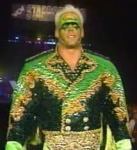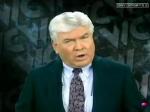This blog was originally supposed to be all about the parallels between life and professional wrestling. It was also going to be about the current WWE product, and some of my favorite matches.
For the most part, rklopolis has been just that. But pretty much everything in not only professional wrestling, but even in my life will always at some point come back to one date…
November 9, 1997.
That was the night my all-time favorite wrestler, Bret “The Hit Man” Hart, lost the WWF Championship to “The Heartbreak Kid” Shawn Michaels.
What should have been just another pay-per-view main event and title change would inadvertently alter the entire wrestling industry.
And on a personal level, it instilled in me five hard truths about wrestling, business, and even life, that I’ve remembered 22 years later.
“Of whom much is given…”:In September 1996, while Bret Hart was on hiatus from the WWF, WCW offered Bret FOUR TIMES what he made at his 1994 WWF peak. But he was bound to lose his marquee status in the rival company.
Bret decided to stay with the WWF, but used the WCW offer as leverage for a raise. In October 1996, WWF owner Vince McMahon doubled his peak pay for three years…part of an unprecedented 20-year deal.
But for they of whom much is given, much is expected. Nobody just gives you a raise. An employer is bound, if not obligated, to justify the increased investment.
If a person fails to meet expectations, an employer can either ask to restructure a contract, or break the contract outright. Vince expected Bret’s return and to bring the WWF ratings, fans, and money on par with WCW.
None of that happened. As a result, Vince wanted to restructure Bret’s contract for less money. Bret refused a pay cut.
“Everything is not about YOU!“: “Stone Cold” Steve Austin, even while he was unable to wrestle due to severe neck injuries, was far more popular than either Shawn Michaels or Bret Hart. He would obviously win the belt… but from who?
After Austin and Bret’s classic match at WrestleMania 13, Bret seemed like the perfect opponent for the ascendant Austin. But Bret simply wasn’t hot enough of a villain by Fall 1997. Shawn, however, was.
And what could generate more outrage and desire to see a bad guy beat more than defeating a Canadian legend in his native country?
To Bret, it was about not losing face in a scripted wrestling match to a real-life opponent in his homeland. To Vince McMahon, it was something else entirely. It was about generating the biggest possible scenario for a new flag bearer… since the last two faltered.
In the conclusion: It ain’t personal… Give it a week… and the most important lesson of all I got out of wrestling’s most infamous incident…






